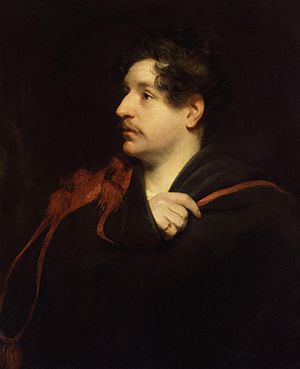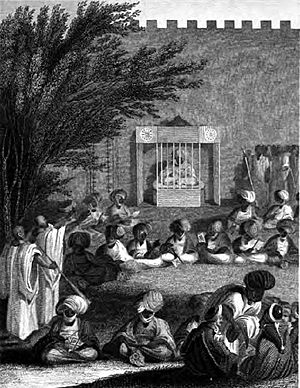Dixon Denham facts for kids

Dixon Denham (born January 1, 1786 – died June 9, 1828) was an English soldier and explorer. He explored parts of West Central Africa and later became the Governor of Sierra Leone.
Contents
Early Life and Army Days
Dixon Denham was born in London, England, on January 1, 1786. He went to Merchant Taylors' School. After school, he trained to be a lawyer. However, he decided to join the army in 1811 instead.
He fought in wars in Portugal, Spain, France, and Belgium. He even received the Waterloo Medal for his service. Denham was known as a brave soldier. He once carried his injured commander to safety during the Battle of Toulouse. He also became friends with the famous Duke of Wellington.
After the wars ended, Lieutenant Denham served in Cambray and Paris. In 1818, he took a break from the army. He traveled around France and Italy. In 1819, he joined the Royal Military College, Sandhurst. He wanted to become a staff officer. Denham was a person who always needed adventure.
Exploring Africa
Denham met explorer Captain George Lyon. This meeting made him want to join a British mission to Africa. The mission aimed to create trade links with West African states. Denham was promoted to Major. He joined Dr. Walter Oudney and Lt. Hugh Clapperton on the mission. They arrived in Tripoli on November 19, 1821.
The Colonial Office gave instructions for the mission. Oudney was to stay in Bornu as a Vice-Consul. Denham and Clapperton were to explore lands south and east of Bornu. Their main goal was to find the path of the Niger River. They also wanted to find where it flowed into the sea.
Denham was held back in Tripoli for a while. The others went ahead to Murzuk in Fezzan without him. Denham left Tripoli on March 5 with 210 Arab tribesmen. When he reached Murzuk, his friends were unwell. Clapperton had a fever, and Oudney had a bad cold. Also, the local leader had stopped them from leaving. He had even taken their camels.
Denham went back to Tripoli to get more money. He also wanted to convince the bashaw, Yusuf Karamanli, to provide an escort. This escort was needed to protect the mission on its journey south. He returned to Tripoli on June 13, 1822. His friends were not sad to see him go. Clapperton wrote that Denham "could not read his sextant, knew not a star in the heavens, and could not take the altitude of the sun."
The bashaw in Tripoli was difficult. Denham decided to return to London. He wanted to report the situation. He also hoped to get a promotion. This would allow him to return as the mission's leader. He boarded a ship to Marseilles. He warned the bashaw's officers that his government would be upset.
The bashaw then wrote to Denham. He offered a 300-man escort for a fee. Denham received this letter in Marseilles. He was still very angry. He sent a letter to Lord Bathurst complaining about Oudney. This letter was not well-received in London. Denham was told off for not being diplomatic. This made relations within the mission even worse.
By late September 1822, Denham was back in Murzuk. He had the merchant and the promised escort. The Colonial Office decided that Clapperton should be Oudney's helper, not Denham's. The mission now had four Britons and several servants. They left Murzuk for Bornu on November 19, 1822.
Clapperton and Oudney were often sick with fevers. They traveled south across the Sahara desert. The path was difficult. They saw many bones of people who had died of thirst. The mission reached the northern shore of Lake Chad on February 4, 1823. They were the first white men to see the lake. The group continued west. They reached Kuka in the Bornu Empire (now Kukawa, Nigeria) on February 17.
From Kuka, Denham joined an expedition into the Mandara Mountains. This was against the wishes of Oudney and Clapperton. The expedition was defeated, and Denham barely escaped.
Later, Oudney and Clapperton went to the Hausa states in December 1823. Denham stayed behind to explore Lake Chad. He explored its western, southern, and south-eastern shores. He also explored the lower parts of the Waube, Logone, and Shari rivers. He proved that Lake Chad was not the source of the Niger River. Many people had believed it was.
A young officer named Ernest Toole helped Denham for a short time. Toole had traveled from Malta. He was already weak from the desert crossing. He soon died of fever. Denham buried him by the lake. Denham returned to Kuka. There he met John Tyrwhitt, who was sent to be a vice-consul. Denham took Tyrwhitt on a trip to the southern tip of Lake Chad.
When they returned to Kuka, Denham found Clapperton there. Oudney had died in January 1824. Clapperton had continued to Kano and Sokoto. He was not allowed to go further by Sultan Muhammad Bello. So, he had to return.
On September 14, 1824, Denham and Clapperton left Kuka for Tripoli. They did not speak to each other during the 133-day journey. Denham and Clapperton returned to England. They received a hero's welcome on June 1, 1825.
After the Expedition
Soon after their return, Clapperton left on another expedition to West Africa. Denham stayed behind to write about their adventures. He made his own role seem bigger. He also made the contributions of Clapperton and Oudney seem smaller.
Denham lived in London. He became a Fellow of the Royal Society. In December 1825, he was promoted to lieutenant-colonel. He sailed to Sierra Leone. His job was to help resettle freed enslaved people. These people were rescued by the British navy. They were brought to Freetown.
Denham spent months surveying the area around Freetown. Later that year, he visited Fernando Po. The British used bases there for their anti-slavery patrols. There, he learned from Richard Lander that Clapperton had died. Denham sent this news to London. In May 1828, Denham returned to Freetown. He became the lieutenant-governor of Sierra Leone. He took over after Sir Neil Campbell died.
Death
Denham was governor of Sierra Leone for only five weeks. He died of "African Fever" (likely malaria) in Freetown on June 9, 1828. He was 42 years old. He was the fourth governor of the colony to die in four years. Denham was buried in the city's Circular Road cemetery on June 15.
Denham in Books
Dixon Denham's adventures are mentioned in Jules Verne's book Five Weeks in a Balloon. In Chapter 30, the book talks about Denham's bravery. It describes how he escaped danger by hiding under his horse. He rode back to Kouka, the capital of Bornou. The book also mentions his expedition with Captain Clapperton and Dr. Oudney. They traveled from Tripoli to Mourzouk and then to Kouka near Lake Chad. Denham explored Bornou, Mandara, and the eastern shores of the lake.
Named After Denham
The sub-Saharan bird called Denham's bustard (Neotis denhami) is named after Dixon Denham.
See also
 In Spanish: Dixon Denham para niños
In Spanish: Dixon Denham para niños
 | Calvin Brent |
 | Walter T. Bailey |
 | Martha Cassell Thompson |
 | Alberta Jeannette Cassell |


